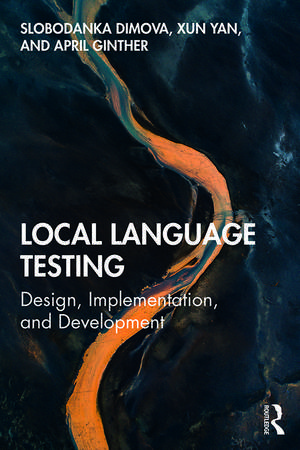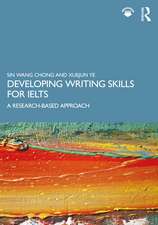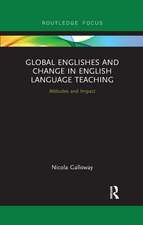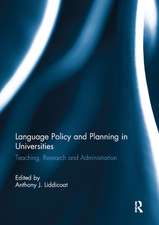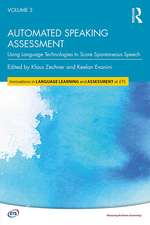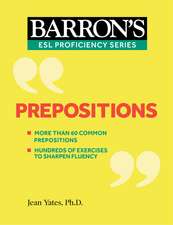Local Language Testing: Design, Implementation, and Development
Autor Slobodanka Dimova, Xun Yan, April Gintheren Limba Engleză Paperback – 3 mar 2020
- the ability of local tests to represent local contexts and values, explicitly and purposefully embed test results within instructional practice, and provide data for program evaluation and research;
- local testing practices grounded in the theoretical principles of language testing, drawing from experiences with local testing and providing practical examples of local language tests, illustrating how they can be designed to effectively function within and across different institutional contexts;
- examples of how local language tests and assessments are developed for use within a specific context and how they serve a variety of purposes (e.g., entry-level proficiency testing, placement testing, international teaching assistant testing, writing assessment, and program evaluation).
| Toate formatele și edițiile | Preț | Express |
|---|---|---|
| Paperback (1) | 352.51 lei 43-57 zile | |
| Taylor & Francis – 3 mar 2020 | 352.51 lei 43-57 zile | |
| Hardback (2) | 766.49 lei 43-57 zile | |
| Taylor & Francis – 10 mar 2020 | 766.49 lei 43-57 zile | |
| Springer International Publishing – 19 iul 2023 | 1112.30 lei 43-57 zile |
Preț: 352.51 lei
Nou
Puncte Express: 529
Preț estimativ în valută:
67.45€ • 70.60$ • 56.14£
67.45€ • 70.60$ • 56.14£
Carte tipărită la comandă
Livrare economică 31 martie-14 aprilie
Preluare comenzi: 021 569.72.76
Specificații
ISBN-13: 9781138588493
ISBN-10: 1138588490
Pagini: 228
Ilustrații: 23 Line drawings, black and white; 11 Halftones, black and white; 18 Tables, black and white; 34 Illustrations, black and white
Dimensiuni: 156 x 234 x 13 mm
Greutate: 0.36 kg
Ediția:1
Editura: Taylor & Francis
Colecția Routledge
Locul publicării:Oxford, United Kingdom
ISBN-10: 1138588490
Pagini: 228
Ilustrații: 23 Line drawings, black and white; 11 Halftones, black and white; 18 Tables, black and white; 34 Illustrations, black and white
Dimensiuni: 156 x 234 x 13 mm
Greutate: 0.36 kg
Ediția:1
Editura: Taylor & Francis
Colecția Routledge
Locul publicării:Oxford, United Kingdom
Public țintă
Postgraduate and UndergraduateCuprins
Preface
Acknowledgements
Chapter 1: Introduction
Why local tests?
Introduction
Our tests
Contexts and problem solving
Large-scale language tests and academic language testing
Organization of the rest of this volume
Further reading
References
Chapter 2: Local tests, local contexts
Introduction
Local contexts and test purpose – decisions about test-takers
Linking test purpose to instructional outcomes
Further reading
References
Chapter 3: Local test development
Introduction
Planning test development
Test design
Technical manuals
Summary
Further reading
References
Chapter 4: Test tasks
Introduction
Discrete-point lexico-grammar items
Integrative measures of general language ability
Skill-based performance assessments
Summary
Further reading
References
Chapter 5: Local test delivery
Introduction
Digital devices
Production of traditional and digitally delivered tests: what does it take?
Opportunities for innovative task design
Test administration
Selection of test delivery format: what to consider
Summary
Further reading
References
Chapter 6: Scaling
Introduction
Why do we need a rating scale?
Different types of rating scales
Approaches to scale development and validation
Issues to consider during scale validation
Unique challenges and opportunities for scaling in local testing contexts
Summary
Further reading
References
Chapter 7: Raters and rater training
Introduction
The promise and perils of rater-mediated language assessment
Rater behavior: a catalog of rater effects
Why do we need rater training? Does it really work?
Best practice for rater training
Summary
Further reading
References
Chapter 8: Data collection, management, and score reporting
Introduction
Data flow
Data storage
Data management
Data uses
Summary
Further reading
References
Chapter 9: Reflections
Introduction
Some reflections on the revision of the TOEPAS
Some reflections on the EPT scale revision process
Some reflections on the development of the OEPT
Conclusions
References
Appendix A
Index
Acknowledgements
Chapter 1: Introduction
Why local tests?
Introduction
Our tests
Contexts and problem solving
Large-scale language tests and academic language testing
Organization of the rest of this volume
Further reading
References
Chapter 2: Local tests, local contexts
Introduction
Local contexts and test purpose – decisions about test-takers
Linking test purpose to instructional outcomes
Further reading
References
Chapter 3: Local test development
Introduction
Planning test development
Test design
Technical manuals
Summary
Further reading
References
Chapter 4: Test tasks
Introduction
Discrete-point lexico-grammar items
Integrative measures of general language ability
Skill-based performance assessments
Summary
Further reading
References
Chapter 5: Local test delivery
Introduction
Digital devices
Production of traditional and digitally delivered tests: what does it take?
Opportunities for innovative task design
Test administration
Selection of test delivery format: what to consider
Summary
Further reading
References
Chapter 6: Scaling
Introduction
Why do we need a rating scale?
Different types of rating scales
Approaches to scale development and validation
Issues to consider during scale validation
Unique challenges and opportunities for scaling in local testing contexts
Summary
Further reading
References
Chapter 7: Raters and rater training
Introduction
The promise and perils of rater-mediated language assessment
Rater behavior: a catalog of rater effects
Why do we need rater training? Does it really work?
Best practice for rater training
Summary
Further reading
References
Chapter 8: Data collection, management, and score reporting
Introduction
Data flow
Data storage
Data management
Data uses
Summary
Further reading
References
Chapter 9: Reflections
Introduction
Some reflections on the revision of the TOEPAS
Some reflections on the EPT scale revision process
Some reflections on the development of the OEPT
Conclusions
References
Appendix A
Index
Notă biografică
Slobodanka Dimova is an associate professor in Language Testing and the coordinator of the Test of Oral English Proficiency for Academic Staff (TOEPAS) at the University of Copenhagen, Denmark. She currently serves as the book review editor for the journal Language Testing, a member of the Executive Committee of the European Association of Language Testing and Assessment (EALTA), and the Chair of the Danish Network for Language Testing and Assessment (DASTEN). She has also been a language testing consultant for the Danish Ministry of Education regarding the foreign language tests administered at the end of obligatory education. Her current research interests include rater training and rater behavior for oral proficiency tests, the development and validation of scales for performance-based tests, the use of technology in language testing and assessment, and the policies and practices related to the implementation of English-medium instruction (EMI) programs at non-Anglophone universities.
Xun Yan is an assistant professor of Linguistics, Second Language Acquisition and Teacher Education (SLATE) and Educational Psychology at the University of Illinois at Urbana-Champaign (UIUC). At UIUC, he also supervises the university-level English Placement Test (EPT), designed to assess international students’ writing and speaking skills. His research interests include speaking and writing assessment, scale development and validation, psycholinguistic approaches to language testing, rater behavior and cognition, and language assessment literacy. His work has been published in Language Testing, Assessing Writing, TESOL Quarterly, and Journal of Second Language Writing.
April Ginther is a professor of English at Purdue University and teaches graduate classes in language testing and quantitative research. During her tenure at Purdue, she has advised more than 20 graduate student dissertations. She is also the director of Purdue’s two primary English language support programs: The Oral English Proficiency Program, the support program for international teaching assistants, and The Purdue Language and Cultural Exchange, the support program for incoming international undergraduate students. As director of both programs, she is responsible for the development, maintenance, and administration of the local tests used to evaluate the English language skills of 1,000 incoming students each academic year. She is a founding member of MwALT, the Midwest Association of Language Testers, and is a well-respected member of the international language testing community. She served as the co-editor of the journal Language Testing from 2012 to 2017.
Xun Yan is an assistant professor of Linguistics, Second Language Acquisition and Teacher Education (SLATE) and Educational Psychology at the University of Illinois at Urbana-Champaign (UIUC). At UIUC, he also supervises the university-level English Placement Test (EPT), designed to assess international students’ writing and speaking skills. His research interests include speaking and writing assessment, scale development and validation, psycholinguistic approaches to language testing, rater behavior and cognition, and language assessment literacy. His work has been published in Language Testing, Assessing Writing, TESOL Quarterly, and Journal of Second Language Writing.
April Ginther is a professor of English at Purdue University and teaches graduate classes in language testing and quantitative research. During her tenure at Purdue, she has advised more than 20 graduate student dissertations. She is also the director of Purdue’s two primary English language support programs: The Oral English Proficiency Program, the support program for international teaching assistants, and The Purdue Language and Cultural Exchange, the support program for incoming international undergraduate students. As director of both programs, she is responsible for the development, maintenance, and administration of the local tests used to evaluate the English language skills of 1,000 incoming students each academic year. She is a founding member of MwALT, the Midwest Association of Language Testers, and is a well-respected member of the international language testing community. She served as the co-editor of the journal Language Testing from 2012 to 2017.
Descriere
Local Language Testing: Design, Implementation, and Development describes the language testing practice that exists in the intermediate space between large-scale standardized testing and classroom assessment, an area that is rarely addressed in the language testing and assessment literature.
Textul de pe ultima copertă
This book describes language testing practices that exist in the intermediate space between large-scale standardized testing and classroom assessment, an area that is rarely addressed in language testing literature. Drawing empirical research on a variety of languages, the volume discusses local language tests’ ability to represent local contexts and values, explicitly and purposefully embed test results within instructional practice, and provide data for program evaluation and research. Although local testing practices have been grounded in the theoretical principles of language testing, the authors in this volume supplement the theoretical content with practical examples of how local tests can be designed to effectively function within and across different institutional contexts.
Caracteristici
Targets a wide readership including researchers, teachers and students with the need to develop local language tests Illustrates local testing research and practices across linguistic cultural socio-political and geographical contexts Covers practical topics directly applicable to test development validation and use
